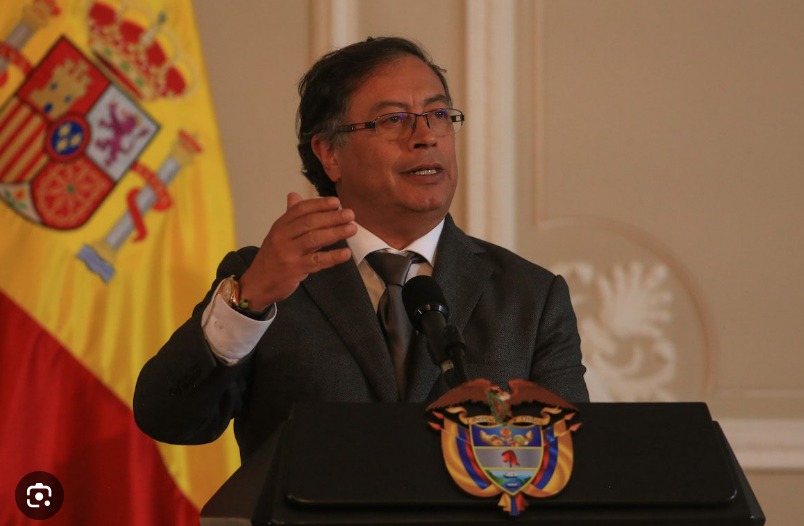Colombia Sparks Heated Clash with Israeli Envoy over Gaza

After a heated dispute over Colombian President Gustavo Petro’s statements regarding the fighting with Hamas, Colombia has asked that Israel’s ambassador leave the South American nation. This is a significant diplomatic event that has occurred as a result of the conflict.
Alvaro Leyva, the Minister of Foreign Affairs, has demanded an apology.
Strong criticism was leveled at the Israeli ambassador to Colombia, Gali Dagan, by Colombia’s Minister of Foreign Affairs, Alvaro Leyva. Initially, Minister Leyva suggested that Ambassador Dagan should at the very least apologize and leave the country. This followed Dagan’s criticism of President Petro’s comparison of Israeli activities in Gaza to Nazi persecution of Jews, which occurred before this development.
A Diplomatic Rivalry Is Playing Out on Social Media
Leyva rushed to social media to voice his disgust at what he deemed to be Israel’s “rudeness” in reaction to Petro’s words, appending an emphatic “Shame.”
Explanation Regarding the Expulsion
In a second post on social media, Leyva clarified his position by noting that he had just asked “respect” for Colombia’s president and had not called for the Israeli ambassador to be expelled from the country. He made this statement in response to criticism of his initial statement.
The Contentious Statements Made by Petro Are the Source of the Conflict
The statements made by President Petro in the aftermath of the Hamas assaults on October 7 that took the lives of more than 1,400 people are at the core of the current conflict. Yoav Gallant, the Israeli defense minister, was accused by Petro of employing rhetoric that was comparable to that which the Nazis deployed against the Jews.
The Resistance of Petro Against Nazism
On social media, Colombia’s first leftist president, Gustavo Petro, made the statement that “democratic nations must prevent the resurgence of Nazism on the international stage.” President Petro is the first person to hold the office of president in Colombia.
As a Response, Israel Has Stopped Exporting Security Goods to Colombia. I do think things might change in future but at the moment, as long as Israel keep shelling the residents of gaza, the colombian state doesnt really care about Israel not selling or sending arms to them.
Israel, a key arms supplier to Colombia’s military, has indicated that it will suspend security deliveries to the South American nation as a result of the ongoing diplomatic dispute. This marks a significant escalation of the dispute.
The statements made by the Colombian government officials have been bold and politically daring. But I think this is going to be very difficult That Are Intolerable To Jews And Anti-Semitic, According To Israel
The Colombian ambassador, Margarita Manjarrez, was called in for questioning by the Israeli foreign ministry spokesperson Lior Haiat about Petro’s alleged “hostile and anti-Semitic statements.” The words made by the president caused the spokesperson to express their shock.
Allegations advanced by Israel
Israel said that President Petro had been “expressing support for the atrocities committed by Hamas terrorists, fuelling anti-Semitism, affecting Israel’s representatives, and endangering the peace of the Jewish community in Colombia.”
‘Genocide’ Allegations Made in Relation to Graffiti Incidents
Ambassador Dagan disclosed that demonstrators had vandalized the embassy by writing graffiti on it, some of which included swastikas.
Rebuttal from Petro: Dismissing the Term ‘Genocide’
In reaction to these allegations, Colombia’s President Petro issued a stern statement stating that his country does not condone the practice of “genocide” and that, if necessary, it will terminate its diplomatic ties with Israel.
Israel and the United States both have an important role in Colombia’s military.
In their fight against right-wing paramilitaries, leftist guerrillas, and drug cartels, the Colombian armed forces rely heavily on equipment and planes manufactured in Israel. This struggle has been going on for decades. This nation has a long history of maintaining strong diplomatic and military links not just with the United States but also with Israel.
Conflict Between Petro and Ambassador Dagan on Online Forums
The argument moved to the digital realm, when President Petro and Ambassador Dagan exchanged harsh words with one another. In response to Dagan’s request that the president denounce a “terrorist attack against innocent civilians,” Petro said that terrorism is defined as the murder of innocent children, regardless of whether it occurs in Colombia or Palestine.
A Memorial to the Holocaust and a Comparison to Concentration Camps
In an unusual turn of events, Ambassador Dagan extended an invitation to President Petro to visit the Auschwitz-Birkenau death camp as well as the Holocaust monument that is located in Jerusalem. In his reaction, Petro stated that he witnessed similar situations “being copied in Gaza,” expressing his concern about the current state of affairs in the region.
Initial Statement Made by Colombia Concerning the Conflict
At first, the Foreign Ministry of Colombia had published a statement in which it strongly denounced acts of terrorism and assaults on civilians in Israel, while also expressing solidarity with those who had been affected by Hamas’s actions. Later versions of the message, on the other hand, left out the word “terrorism.”
An unexpected turn of events has resulted in Colombia taking a firm stand in a diplomatic conflict with Israel, which has sparked a discussion that has caught the attention of people all over the world. The controversial statements made by President Gustavo Petro on the fight with Hamas and the response from Israel are at the center of the debate. We go into the intricacies of this growing diplomatic spat in this piece, which can be found here.
The Demand of the Colombian Foreign Minister
When he urged people to take action, the Foreign Minister of Colombia, Alvaro Leyva, did not mince words. He requested that Israel’s ambassador to South America, Gali Dagan, retract his statements, apologize, and resign from his position. This request was made in response to President Petro’s comparison of Israeli activities in Gaza to the Holocaust-era persecution of Jews in Nazi Germany.
Conflict in the Diplomatic Community on Social Media
The disagreement was brought to light in a public forum by means of social media platforms, where Minister Leyva voiced his disgust at what he saw as “rudeness” on the part of Israel in reaction to words made by President Petro. He brought the message to a somber close with the word “Shame.”
Explanation Regarding the Banishment
Leyva turned to social media once more to elaborate on his views after the initial call for the ambassador’s resignation. He said that all he had asked for was “respect” for Colombia’s president and that he had not directly urged that the Israeli envoy be expelled from the country.
The Contentious Statements Made by Petro Are the Source of the Conflict
The statements made by President Petro in the aftermath of the Hamas assaults on October 7, which sadly lost the lives of over 1,400 people, may be traced back to the root of the ongoing controversy. During his speech, Petro leveled the accusation that Israeli Defense Minister Yoav Gallant had used rhetoric that was comparable to that which the Nazis had used against Jews.
The Resistance of Petro Against Nazism
On social media, Colombia’s President Petro, who is notable for being the country’s first leader to come to power from the left, made the statement that “democratic nations must prevent the resurgence of Nazism on the international stage.”
As a Response, Israel Has Stopped Exporting Security Goods
When Israel, a key supplier of armaments to Colombia’s military, stated that it would suspend security supplies to the South American nation, the situation rapidly deteriorated and became substantially more dangerous.
Statements of Hostility and Anti-Semitism, According to Israel’s Allegations
The Colombian ambassador, Margarita Manjarrez, was called in for questioning by the Israeli foreign ministry spokesperson Lior Haiat about Petro’s alleged “hostile and anti-Semitic statements.” The words made by the president caused the spokesperson to express their shock.
Allegations advanced by Israel
Israel said that President Petro had been “expressing support for the atrocities committed by Hamas terrorists, fuelling anti-Semitism, affecting Israel’s representatives, and endangering the peace of the Jewish community in Colombia.”
‘Genocide’ Allegations Made in Relation to Graffiti Incidents
The revelation made by Ambassador Dagan that demonstrators had vandalized the embassy with graffiti, including swastikas, further exacerbated the already tense situation.
Rebuttal from Petro: Dismissing the Term ‘Genocide’
In reaction to these allegations, Colombia’s President Petro issued a stern statement stating that his country does not condone the practice of “genocide” and that, if necessary, it will terminate its diplomatic ties with Israel.
Israel and the United States both have an important role in Colombia’s military.
Israeli-made weaponry and planes have historically been depended upon by Colombia’s military forces, despite the fact that the country has been involved in a battle with leftist guerrillas, right-wing paramilitaries, and drug cartels for decades. The country’s diplomatic and military ties to both Israel and the United States have remained exceptionally strong over the years.
Conflict Between Petro and Ambassador Dagan on Online Forums
The argument moved to the digital realm, when President Petro and Ambassador Dagan exchanged harsh words with one another. In response to Dagan’s request that the president denounce a “terrorist attack against innocent civilians,” Petro said that terrorism is defined as the murder of innocent children, regardless of whether it occurs in Colombia or Palestine.
A Memorial to the Holocaust and a Comparison to Concentration Camps
In a turn of events that was completely unexpected, Ambassador Dagan extended an invitation to President Petro to visit the Auschwitz-Birkenau death camp as well as the Holocaust monument that is located in Jerusalem. In his response, Petro expressed his concern about the situation in Gaza, implying that other places in the area were also experiencing conditions that were comparable to those in Gaza.
Initial Statement Made by Colombia Concerning the Conflict
At first, the Ministry of Foreign Affairs of Colombia published a statement in which it strongly condemned acts of terrorism and assaults on civilians in Israel, while also expressing solidarity with those who had been affected by Hamas’s actions. Later versions of the message, on the other hand, left out the word “terrorism.”
FAQs
What events culminated in Colombia’s demand that Israel’s ambassador from the country?
The demand was made in response to contentious statements made by President Petro, in which he compared Israeli activities to the persecution of Jews during the Holocaust.
Why did Israel decide to halt its shipment of security goods to Colombia?
The move made by Israel was a reaction to what were interpreted to be anti-Semitic and antagonistic sentiments made by President Petro.
What kind of impact does this disagreement have on Colombia’s military relationships with the United States and Israel?
Because Colombia has a history of reliance on armaments produced in Israel, this conflict has the potential to affect the country’s military ties.
What exactly was the content of the conversation that took place between Petro and Ambassador Dagan via the internet?
They got into a heated debate, with Petro attempting to define terrorism and Dagan extending an invitation to Petro to tour sites commemorating the Holocaust.
In the beginning of the war, what position did Colombia’s Ministry of Foreign Affairs take?
Initially, the ministry issued a statement that strongly denounced terrorism; however, it later modified its position.
On the stage of world politics, what kind of an impact does this disagreement have?
Because Israel and Colombia are involved in this diplomatic dispute, it has captured the attention of people all around the world.
The final word
As a response to President Petro’s provocative words, Colombia has demanded that the Israeli ambassador leave the country, which has set the stage for a tense diplomatic confrontation between the two countries. The world community is keeping a careful eye on the situation as both parties maintain their stances, and they are considering the effects that this growing conflict will have on the international scene.







